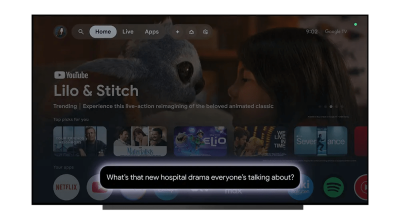Google Gemini AI Set to Transform Over 300 Million TVs, Ushering in a New Era of Smart Entertainment
@devadigax22 Sep 2025

Google is poised to fundamentally redefine the television experience for hundreds of millions of users worldwide with the imminent rollout of its advanced Gemini AI to Google TV and other Android TV OS-powered devices. This strategic move, impacting an estimated 300 million active devices when fully implemented, marks a significant leap forward in the integration of generative AI into daily life, moving beyond smartphones and web browsers directly into the heart of the living room.
The arrival of Gemini on the big screen isn't merely an incremental update; it represents Google's ambition to weave its most sophisticated artificial intelligence into the fabric of its vast hardware ecosystem. For years, voice assistants like Google Assistant have provided basic control and search functions on smart TVs. Gemini, however, promises a vastly more intelligent, conversational, and context-aware interaction, transforming how users discover content, manage their smart homes, and engage with their entertainment.
Imagine no longer fumbling through menus or struggling with imprecise voice commands. With Gemini, users will be able to engage in natural, complex conversations with their TV. Instead of simply asking, "Show me action movies," a user might ask, "Find me a sci-fi movie with strong female leads that's available on streaming services I subscribe to, and has a high rating." Gemini's multimodal capabilities, a hallmark of its design, mean it can process not just voice, but also understand visual context, ultimately providing more relevant and personalized recommendations.
Beyond content discovery, Gemini's advanced reasoning could unlock a new level of personalization. The AI could learn individual viewing habits, preferences across different family members, and even understand nuances like mood to suggest content that genuinely resonates. It might proactively suggest watching the next episode of a series, offer trivia about actors on screen, or even provide summaries of shows for those who missed previous seasons, ensuring a richer, more informed viewing experience.
This integration also carries profound implications for the smart home ecosystem. Google TV devices often serve as central hubs for controlling smart lights, thermostats, and security cameras. With Gemini, these interactions become more seamless and intelligent. Users could command, "Set the mood for movie night," and Gemini would dim the lights, adjust the temperature, and launch a streaming app, all while confirming the settings with natural language. The TV, often the largest screen and a focal point of family interaction, is thus elevated to a truly intelligent control center.
From Google's perspective, this rollout is a crucial piece of its overarching AI strategy. By embedding Gemini across its product line – from Search and Workspace to Android and now TV – the company aims to create a unified, intelligent experience that solidifies its position as a leader in the AI-first world. This move leverages Google's existing market penetration in the smart TV space, providing a massive launchpad for Gemini's widespread adoption and further entrenching users within the Google ecosystem.
The competitive landscape in the smart home and entertainment sectors is fierce, with players like Amazon's Alexa and Fire TV, and Apple's Siri and Apple TV, vying for market share. Google's deployment of Gemini to over 300 million devices instantly gives it a significant edge, offering a level of AI sophistication that promises to surpass current offerings. It forces competitors to accelerate their own AI integration, setting a new benchmark for what consumers can expect from their smart entertainment devices.
Of course, with such powerful AI comes considerations regarding user privacy and data handling. Google will need to clearly communicate its policies and ensure robust safeguards are in place to build and maintain user trust. The challenge will be to deliver transformative AI experiences without compromising personal data or creating a sense of being constantly monitored. User adoption will also depend on the AI being truly intuitive and helpful, not overwhelming or prone to errors.
Looking ahead, the potential for Gemini on TV is immense. Developers could leverage Gemini APIs to create entirely new interactive applications and experiences. Imagine AI-powered gaming that adapts to your play style, educational content that responds to a child's questions in real-time, or even interactive advertising that is genuinely engaging and relevant. The television, once a passive consumption device, is evolving into an active participant in our digital lives.
In essence, Google's decision to bring Gemini AI to hundreds of millions of TVs is more than just a product update; it's a strategic declaration. It signals a future where entertainment is not just consumed but intelligently curated, where the boundaries between content, smart home control, and personal assistance blur into a cohesive, intuitive experience. The living room is on the cusp of a profound transformation, and Google's Gemini is leading the charge into this new era of intelligent entertainment.
The arrival of Gemini on the big screen isn't merely an incremental update; it represents Google's ambition to weave its most sophisticated artificial intelligence into the fabric of its vast hardware ecosystem. For years, voice assistants like Google Assistant have provided basic control and search functions on smart TVs. Gemini, however, promises a vastly more intelligent, conversational, and context-aware interaction, transforming how users discover content, manage their smart homes, and engage with their entertainment.
Imagine no longer fumbling through menus or struggling with imprecise voice commands. With Gemini, users will be able to engage in natural, complex conversations with their TV. Instead of simply asking, "Show me action movies," a user might ask, "Find me a sci-fi movie with strong female leads that's available on streaming services I subscribe to, and has a high rating." Gemini's multimodal capabilities, a hallmark of its design, mean it can process not just voice, but also understand visual context, ultimately providing more relevant and personalized recommendations.
Beyond content discovery, Gemini's advanced reasoning could unlock a new level of personalization. The AI could learn individual viewing habits, preferences across different family members, and even understand nuances like mood to suggest content that genuinely resonates. It might proactively suggest watching the next episode of a series, offer trivia about actors on screen, or even provide summaries of shows for those who missed previous seasons, ensuring a richer, more informed viewing experience.
This integration also carries profound implications for the smart home ecosystem. Google TV devices often serve as central hubs for controlling smart lights, thermostats, and security cameras. With Gemini, these interactions become more seamless and intelligent. Users could command, "Set the mood for movie night," and Gemini would dim the lights, adjust the temperature, and launch a streaming app, all while confirming the settings with natural language. The TV, often the largest screen and a focal point of family interaction, is thus elevated to a truly intelligent control center.
From Google's perspective, this rollout is a crucial piece of its overarching AI strategy. By embedding Gemini across its product line – from Search and Workspace to Android and now TV – the company aims to create a unified, intelligent experience that solidifies its position as a leader in the AI-first world. This move leverages Google's existing market penetration in the smart TV space, providing a massive launchpad for Gemini's widespread adoption and further entrenching users within the Google ecosystem.
The competitive landscape in the smart home and entertainment sectors is fierce, with players like Amazon's Alexa and Fire TV, and Apple's Siri and Apple TV, vying for market share. Google's deployment of Gemini to over 300 million devices instantly gives it a significant edge, offering a level of AI sophistication that promises to surpass current offerings. It forces competitors to accelerate their own AI integration, setting a new benchmark for what consumers can expect from their smart entertainment devices.
Of course, with such powerful AI comes considerations regarding user privacy and data handling. Google will need to clearly communicate its policies and ensure robust safeguards are in place to build and maintain user trust. The challenge will be to deliver transformative AI experiences without compromising personal data or creating a sense of being constantly monitored. User adoption will also depend on the AI being truly intuitive and helpful, not overwhelming or prone to errors.
Looking ahead, the potential for Gemini on TV is immense. Developers could leverage Gemini APIs to create entirely new interactive applications and experiences. Imagine AI-powered gaming that adapts to your play style, educational content that responds to a child's questions in real-time, or even interactive advertising that is genuinely engaging and relevant. The television, once a passive consumption device, is evolving into an active participant in our digital lives.
In essence, Google's decision to bring Gemini AI to hundreds of millions of TVs is more than just a product update; it's a strategic declaration. It signals a future where entertainment is not just consumed but intelligently curated, where the boundaries between content, smart home control, and personal assistance blur into a cohesive, intuitive experience. The living room is on the cusp of a profound transformation, and Google's Gemini is leading the charge into this new era of intelligent entertainment.
Comments
Related News

Google Sheets Just Got Smarter: Gemini AI Now Explains Why Your Formulas Failed
@devadigax | 25 Sep 2025
@devadigax | 25 Sep 2025

Google's Gemini-Powered Mixboard: An AI Moodboard Revolution for Designers
@devadigax | 23 Sep 2025
@devadigax | 23 Sep 2025

Google's Gemini AI: Your New Mobile Gaming Co-pilot?
@devadigax | 23 Sep 2025
@devadigax | 23 Sep 2025

Google Unleashes Shareable Gemini AI Assistants: The "Gems" Revolutionizing Collaboration
@devadigax | 18 Sep 2025
@devadigax | 18 Sep 2025

Google's Gemini AI Lands in Chrome: Agentic Browsing Ushers in a New Era of Automated Tasks
@devadigax | 18 Sep 2025
@devadigax | 18 Sep 2025
 AI Tool Buzz
AI Tool Buzz